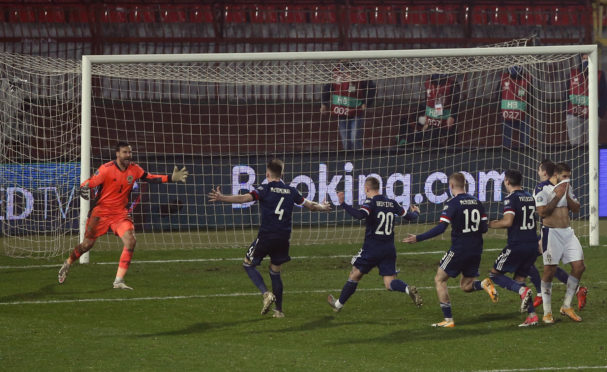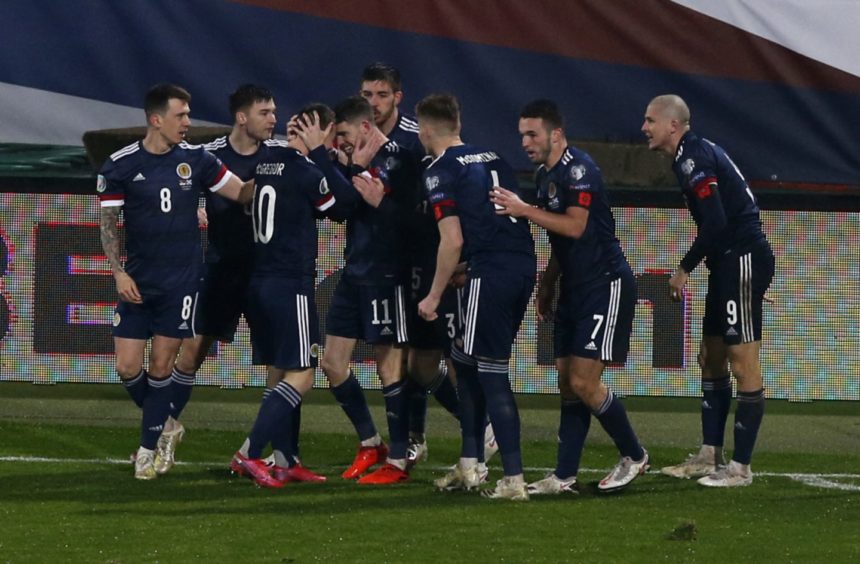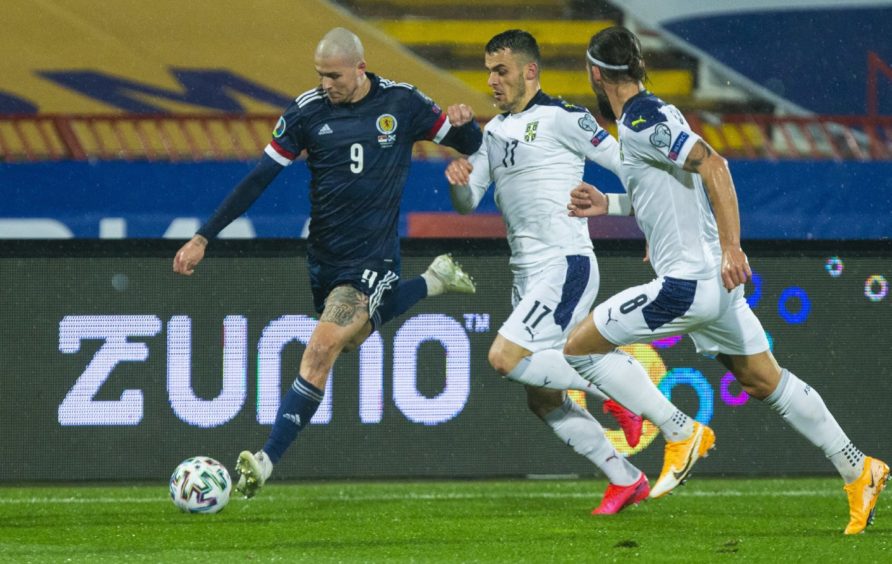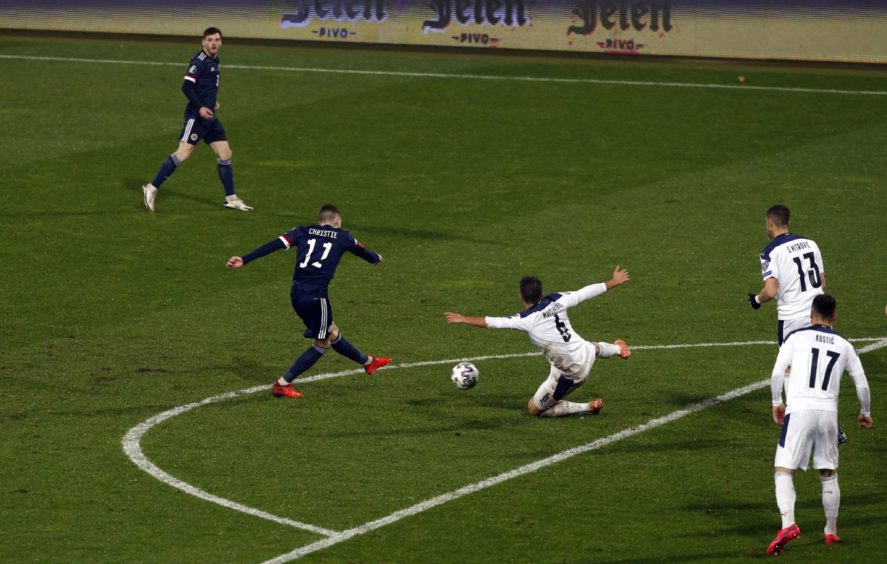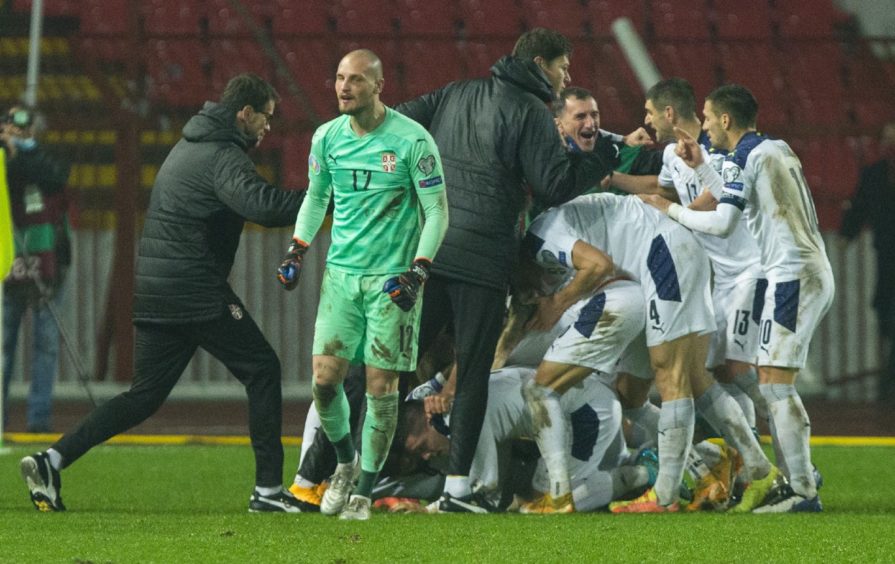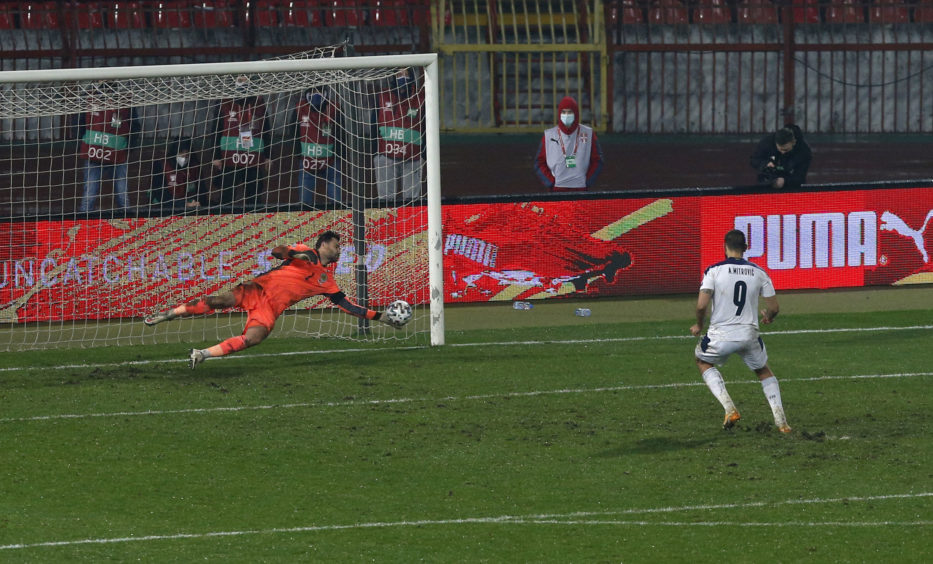This time it was different.
Scotland made it happen. Twelve yards to end 22 years of hurt.
Paul Scholes’ brace at Hampden. The hammering by the Dutch. Christian Panucci’s header. Georgia away. 4-6-0. Chris Iwelumo’s miss. Ghosts laid to rest on an unforgettable night in Belgrade.
Scotland did not make it easy. They never do. Ryan Christie’s superb opener looked to be sending the Scots to the Euros. But Luka Jovic’s intervention dragged the agony out longer.
It came down to penalties again. Of course it does. With the first nine kicks perfect, David Marshall was the man of the moment, keeping out Aleksandar Mitrovic to prompt euphoria.
Craig Brown was the man before last night to lead Scotland out at a major tournament. Finally, his name can be moved up the honours board and a new name added to the list: Steve Clarke.
The Scotland head coach is not one to be carried away by hyperbole and bombast. He leaves that to those outside his inner circle. But the stoic pragmatism he has brought to the national team has, in a short space of time, carried them to places not seen in two decades.
A generation of Scottish talent were never able to garnish their careers with a major tournament appearance. James McFadden, Darren Fletcher, Scott Brown; illustrious names who wore the navy blue with pride but had to drink in those near-misses.
But this group and the bonds they have forged, will be bound together by this night in Belgrade.
“Scotland lead on this day of destiny!”
Steve Clarke’s side take a deserved lead in Belgrade through Ryan Christie’s precise finish from the edge of the box! 🎯pic.twitter.com/BdJYCnXOto
— Sky Sports Scotland (@ScotlandSky) November 12, 2020
Surprise is not really a word in Clarke’s repertoire and his team selection reflected that. Kieran Tierney and Ryan Christie for Andy Considine and Ryan Fraser were sensible, expected decisions.
The unsettling optimism around Scotland was not shifted by a passive Serbia in the opening 20 minutes. Lyndon Dykes continued to do Lyndon Dykes things; an unyielding physical menace who thrives on aerial battles like a military jet.
Sasa Lukic threatened to shatter the mystique around this Clarke side. Aleksandar Mitrovic pinned Declan Gallagher and teed up the Torino man, with a shaped effort seeking the inside of the far post. Its deviation wide brought sighs of relief
Neither side gained a stranglehold in strangely calm first period. That is how Clarke would have wanted it though – this Scotland side do not play to be expansive.
There was enough encouragement for what was to come. John McGinn’s boisterous running style and close control was a nuisance for Serbian defenders to get to grips with, like trying to wrest a tennis ball off an excitable puppy in a phone box.
Fears about the back three – which included Scott McTominay, a central midfielder, and a left-back in Kieran Tierney – were so far unfounded.
The way Scotland operate under Clarke, chances do not come along like London buses. The few that do are usually clear and need to be taken.
You worried, for a brief moment, that Andy Robertson’s was it. Superb hold-up play again from Dykes – the night’s running theme – freed a space on the right side of the Serbian defence. Robertson galloped into gratefully but a defender’s finish, high over the bar, was not the desired outcome.
But the cursing of that missed opportunity lasted all of a minute. Christie, the kid from Inverness with the gliding touch and the crafty left foot, produced the goods, caressing the ball through a couple of Serbian bodies to kiss the inside of the post. Touch woodwork, this would be enough.
The great Serbian retort did not come by force but in dribs and drabs. Sergej Milinkovic-Savic, Mitrovic, Dusan Tadic; gilded names on the international scene but ones unable to come to their country’s rescue.
Jovic, who has endured a tumultuous time as a Real Madrid player, was thrown on for the salvage operation. Scotland had weathered what this tame Serbian side had to offer but nothing watching the national team is ever simple. Jovic, with his downward header creeping beyond David Marshall into the net, was a painful reminder of that.
How would they respond? Would the familiar gut-punch of despair come back to haunt Scotland again? Or could a second wind be found?
McGinn, Dykes and Christie, the outstanding front three, had all been sacrificed towards the end of normal time as Clarke went into preservation mode. Callum Paterson, Oli McBurnie and Kenny McLean, the penalty hero against Israel, were next on base.
Much was now going Serbia’s way. An outstretched hand from Marshall prevented Nemanja Gudelj from making himself the hero. Energy and momentum appeared sapped from Scotland.
Little stuck with Paterson and McBurnie. With every ball that rebounded back into Scotland territory, the nerves frayed slightly more. Penalties beckoned inexorably closer. Griffiths was the final roll of the dice, replacing the tiring Stephen O’Donnell.
It was the Celtic man up first, with a big right hand from Predrag Rajkovic not enough to keep it out. Tadic did likewise. Callum McGregor delivered, as did Jovic, and McTominay kept up Scotland’s perfect start.
Gudelj, McBurnie and Aleksandar Katai took the shootout to four apiece. McLean made sure with his kick and Marshall, as he was at Hampden, turned hero again to deny Mitrovic.
So after all the false dawns, a new day has come. Scotland will face England, Croatia and the Czech Republic. Wherever, whenever, they will be there.
Since the final whistle blew in the Stade Geoffroy-Guichard 22 years ago, ending a bleak 3-0 defeat for Scotland against Morocco, Latvia, Albania and Iceland have all made their major competition debuts. Senegal danced their way into football consciousness with a vibrant showing in the Far East. Wales have surged to a European Championship semi-final on a red sea of exultation, ending a 48-year hiatus from tournament football with unbridled joy.
Now it is Scotland’s turn.
